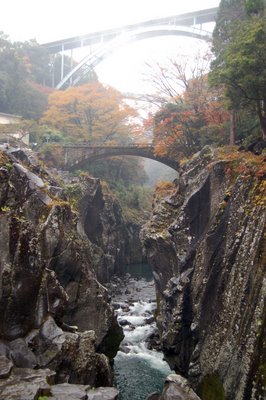 Bridges seem to come in threes, stacked above each other.
Bridges seem to come in threes, stacked above each other.Fact: No river in Japan remains undammed.
The cause is well documented. The civil engineers make the decisions, not environmentalists. Politicians pump in money for public work schemes that reduce unemployment and shift benefits to the democratically-stronger countryside constituencies. Murkier dealings come to light from time to time; there is a lot of money to be made in construction, legally or not.
But there seems to be more going on in the underlying attitude to nature here. The Japanese have a strong sense that nature is out to get them, whether by Tsunami, Earthquake, Typhoon, Jellyfish [see entry for 10/21/06]. There is some truth in it, but the resulting paranoia is both restrictive and damaging.
I went to see the great gorge in Takachiho, central Kyushu; a wonderful place, with scuplted rock, corrugated cliffs, and cool green water.
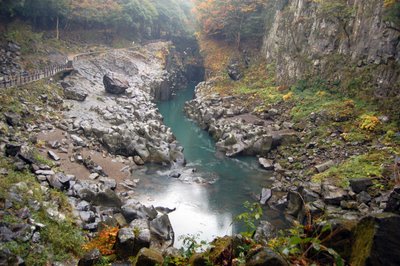
The gorge is lined with concrete paths and fences. At least, it keeps the hordes of tourists in one place.
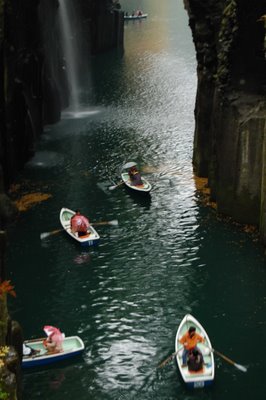
But the most beautiful part of the gorge has become a boating pond, for tourists to row around in. Or rather, for tourists to photograph each other rowing around in. While in fact going in circles. Is there a word to describe something that is at once comic and depressing?
As the gorge opens up at the end of the tourist trail, the path continues, but signs tell you not to carry on: “Dangerous! Stop!” Knowing by now the civil authority’s attitude to danger (ie paranoia), I carried on walking. As it turned out, by ‘danger’, it meant you would not have been able to get along it in a wheelchair. Probably not recommended for the infirm or very elderly. The path was wide and concrete, the river mellow, the single boulder easy to cross.
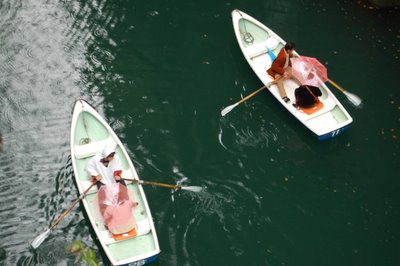 I should point out that these excessive warnings are not like those in the U.K. or America. Japan does not share our highly litigious culture. These signs are not the ‘Get out of Jail’ cards that our companies and organisations sprinkle so liberally to prevent damaging court cases. Rather, I think these are a sign of the very strong sense of public duty and culpability in Japanese society. If someone hurt themselves, that would be YOUR fault, as municipal worker.
I should point out that these excessive warnings are not like those in the U.K. or America. Japan does not share our highly litigious culture. These signs are not the ‘Get out of Jail’ cards that our companies and organisations sprinkle so liberally to prevent damaging court cases. Rather, I think these are a sign of the very strong sense of public duty and culpability in Japanese society. If someone hurt themselves, that would be YOUR fault, as municipal worker.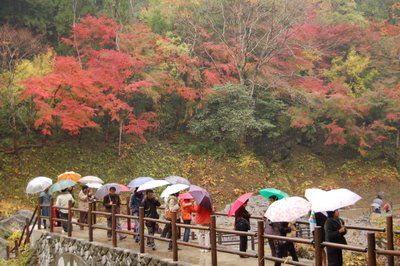 As I walked, I grumbled to myself about all this paranoia and environmental damage. I clambered around on the rocks, and sat in the drizzle on a boulder, twisting around to try to find a direction that would allow me to avoid seeing any concrete. As I stepped from one stone to the next, it gave way beneath me, and I sprawled into the river, banging my knee and drenching my leg.
As I walked, I grumbled to myself about all this paranoia and environmental damage. I clambered around on the rocks, and sat in the drizzle on a boulder, twisting around to try to find a direction that would allow me to avoid seeing any concrete. As I stepped from one stone to the next, it gave way beneath me, and I sprawled into the river, banging my knee and drenching my leg.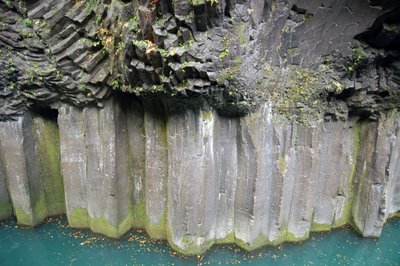 I limped back into town, tail between my legs. I think something heard me muttering about paranoia.
I limped back into town, tail between my legs. I think something heard me muttering about paranoia.
No comments:
Post a Comment